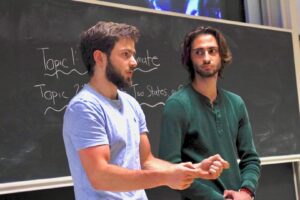AUSTIN, Texas—The Bureau of Economic Geology at The University of Texas at Austin’s Jackson School of Geosciences has entered into a Memorandum of Understanding with the state of Texas to help prepare the state’s bid for FutureGen, a $1 billion federal program to develop the power plant of the future.
Texas Railroad Commissioner Michael L. Williams announced the agreement today at a meeting with energy leaders in Houston accompanied by Dr. Scott W. Tinker, director of the bureau and the state geologist of Texas.
FutureGen is a research initiative of the U.S. Department of Energy to build the cleanest fossil fuel-based power plant in the world. The prototype will produce electricity with near zero emissions, capture carbon dioxide for use in enhanced oil recovery and capture hydrogen gas for use in the refining, chemical and transportation fuel industries.
“As an undisputed world energy leader, Texas is uniquely qualified to undertake this critical task of defining how the energy industry of the future will evolve,” said Williams.
Williams called the bureau the most qualified institution in the state to help direct the Texas response. The bureau’s experience with carbon dioxide (CO2) injection could be especially relevant because the process is expected to be crucial to the FutureGen prototype.
“Texas is the only state that can use the CO2 from FutureGen for enhanced oil recovery on a large scale basis,” Williams said. “We have the ability to generate billions of barrels of oil for CO2 enhanced recovery. Every barrel of oil we can develop domestically makes this nation less dependent on the volatile Middle East.”
FutureGen will also develop new and cleaner technologies for converting coal to electricity. A FutureGen plant in Texas, in addition to benefiting the economy, could help improve the state’s air quality.
“I am convinced that not only does Texas have the best geology for the project, but we have also the human expertise in our energy sector,” said Tinker. “Look around this state and you see businesses and people who are already engaged in all the efforts that will build the FutureGen prototype. Texas is uniquely qualified for the siting, construction and operation of FutureGen.”
President Bush announced FutureGen Feb. 27, 2003, and Congress has approved the initial funding plan. Project definition and site selection are scheduled to be discussed in late 2005 through 2006, with the plan calling for construction to begin as early as 2008. Continuous power plan operations could begin as early as 2012 with carbon sequestration to follow.
The Bureau of Economic Geology functions as the State Geological Survey, the Regional Lead Organization for the Petroleum Technology Transfer Council, and a research unit of The University of Texas at Austin. The bureau provides wide-ranging advisory, technical and research services to industries, nonprofit organizations and federal, state and local government agencies.
For more information contact: J.B. Bird, 512-232-9623.



